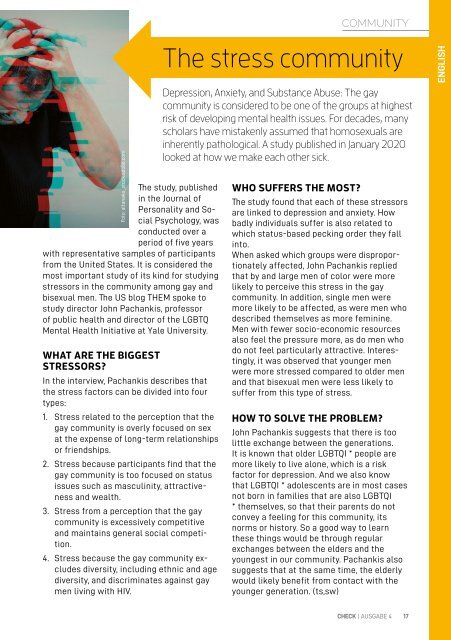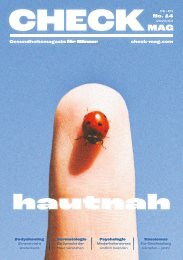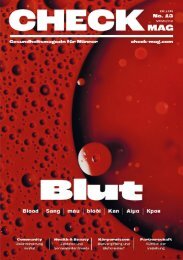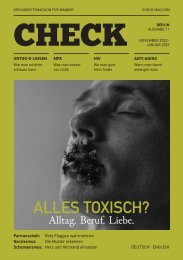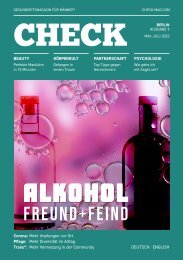CHECK Magazin - Gesundheitsmagazin für Männer No.4
Die Verschmutzung des Planeten findet aber auch im Kleinen statt und betrifft uns ganz direkt. Denn täglich nehmen wir unzählige Gifte durch die Nahrung, Kosmetik oder Alltagsgegenstände in uns auf. Welches sind die größten Gefahren und wie kann man sich im Alltag davor schützen?
Die Verschmutzung des Planeten findet aber auch im Kleinen statt und betrifft uns ganz direkt. Denn täglich nehmen wir unzählige Gifte durch die Nahrung, Kosmetik oder Alltagsgegenstände in uns auf. Welches sind die größten Gefahren und wie kann man sich im Alltag davor schützen?
Erfolgreiche ePaper selbst erstellen
Machen Sie aus Ihren PDF Publikationen ein blätterbares Flipbook mit unserer einzigartigen Google optimierten e-Paper Software.
COMMUNITY<br />
Foto: altanaka_stock.adobe.com<br />
The study, published<br />
in the Journal of<br />
Personality and Social<br />
Psychology, was<br />
conducted over a<br />
period of five years<br />
with representative samples of participants<br />
from the United States. It is considered the<br />
most important study of its kind for studying<br />
stressors in the community among gay and<br />
bisexual men. The US blog THEM spoke to<br />
study director John Pachankis, professor<br />
of public health and director of the LGBTQ<br />
Mental Health Initiative at Yale University.<br />
WHAT ARE THE BIGGEST<br />
STRESSORS?<br />
In the interview, Pachankis describes that<br />
the stress factors can be divided into four<br />
types:<br />
1. Stress related to the perception that the<br />
gay community is overly focused on sex<br />
at the expense of long-term relationships<br />
or friendships.<br />
2. Stress because participants find that the<br />
gay community is too focused on status<br />
issues such as masculinity, attractiveness<br />
and wealth.<br />
3. Stress from a perception that the gay<br />
community is excessively competitive<br />
and maintains general social competition.<br />
4. Stress because the gay community excludes<br />
diversity, including ethnic and age<br />
diversity, and discriminates against gay<br />
men living with HIV.<br />
The stress community<br />
Depression, Anxiety, and Substance Abuse: The gay<br />
community is considered to be one of the groups at highest<br />
risk of developing mental health issues. For decades, many<br />
scholars have mistakenly assumed that homosexuals are<br />
inherently pathological. A study published in January 2020<br />
looked at how we make each other sick.<br />
WHO SUFFERS THE MOST?<br />
The study found that each of these stressors<br />
are linked to depression and anxiety. How<br />
badly individuals suffer is also related to<br />
which status-based pecking order they fall<br />
into.<br />
When asked which groups were disproportionately<br />
affected, John Pachankis replied<br />
that by and large men of color were more<br />
likely to perceive this stress in the gay<br />
community. In addition, single men were<br />
more likely to be affected, as were men who<br />
described themselves as more feminine.<br />
Men with fewer socio-economic resources<br />
also feel the pressure more, as do men who<br />
do not feel particularly attractive. Interestingly,<br />
it was observed that younger men<br />
were more stressed compared to older men<br />
and that bisexual men were less likely to<br />
suffer from this type of stress.<br />
HOW TO SOLVE THE PROBLEM?<br />
John Pachankis suggests that there is too<br />
little exchange between the generations.<br />
It is known that older LGBTQI * people are<br />
more likely to live alone, which is a risk<br />
factor for depression. And we also know<br />
that LGBTQI * adolescents are in most cases<br />
not born in families that are also LGBTQI<br />
* themselves, so that their parents do not<br />
convey a feeling for this community, its<br />
norms or history. So a good way to learn<br />
these things would be through regular<br />
exchanges between the elders and the<br />
youngest in our community. Pachankis also<br />
suggests that at the same time, the elderly<br />
would likely benefit from contact with the<br />
younger generation. (ts,sw)<br />
ENGLISH<br />
<strong>CHECK</strong> | AUSGABE 4<br />
17


